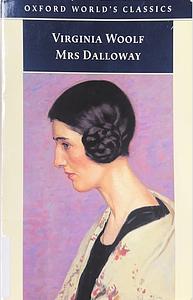You need to sign in or sign up before continuing.
Take a photo of a barcode or cover
funny
reflective
sad
slow-paced
Plot or Character Driven:
Character
Strong character development:
Complicated
Loveable characters:
Yes
Diverse cast of characters:
Yes
Flaws of characters a main focus:
Yes
Mrs. Dalloway is an exemplary character study. The flow of the prose exquisitely captures consciousness, and the themes are carefully built up. At times the endless litany of observation is overwhelming, but that disorientation mirrors the futility of our own attributions of meaning to cause and effect. But Woolf does occasionally create true irrelevance within her facsimile, making this short book feel a bit longer than it should. And the book is sometimes funny, in the way that human nature is funny. Woolf shows human frailness and pettiness in a light that is both ironic and beautiful.
I have to confess - my first thought about Virginia Woolf, after reading this - is that she must've been a real PITA to know as a friend in real life. Seriously - can you imagine someone who is always making up stories about the minutiae of people's thoughts throughout the day? I wonder if she was a bit neurotic and worked herself up with worry about things as a result of the ability she has demonstrated here to catalog the stream of thoughts and reactions of various characters to the interactions and experiences they have in a single day to such detail.
Personally, I would not want to expose my own thoughts in such a way - it would reveal me to be a very boring, unintelligent and uninteresting person.
Actually, I felt rather the same way about many of the characters in this book. What I thought was intriguing about this book was the way she presented things from different perspectives -- how different characters viewed each other, for example. Even colors are seen differently - the daughter is described as wearing a pink dress by her mother and father but someone else notices her as a sexy young thing in red, while yet another older woman sees her as dressed rather indecently.
Her treatment of PTSD is hailed far and wide as one of the finest, early literary examples of such a thing - and it reminds me a bit of the neurotic mind we find in "Crime & Punishment." Her treatment of the way Clarissa views the doctor who treats the war veteran/suicide is also pretty astonishing - both Clarissa and the war veteran view the doctor as someone who, despite presenting as pretty standard bourgeois - is somehow bad, or evil - and Clarissa has the thought after hearing about the suicide that it was an obvious outcome if the young man was treated by this particular doctor - that death would be preferable.
It makes me wonder if Woolf was implying a sort of PTSD for the characters who have been trapped in the upper/middle class social structure.
Personally, I would not want to expose my own thoughts in such a way - it would reveal me to be a very boring, unintelligent and uninteresting person.
Actually, I felt rather the same way about many of the characters in this book. What I thought was intriguing about this book was the way she presented things from different perspectives -- how different characters viewed each other, for example. Even colors are seen differently - the daughter is described as wearing a pink dress by her mother and father but someone else notices her as a sexy young thing in red, while yet another older woman sees her as dressed rather indecently.
Her treatment of PTSD is hailed far and wide as one of the finest, early literary examples of such a thing - and it reminds me a bit of the neurotic mind we find in "Crime & Punishment." Her treatment of the way Clarissa views the doctor who treats the war veteran/suicide is also pretty astonishing - both Clarissa and the war veteran view the doctor as someone who, despite presenting as pretty standard bourgeois - is somehow bad, or evil - and Clarissa has the thought after hearing about the suicide that it was an obvious outcome if the young man was treated by this particular doctor - that death would be preferable.
It makes me wonder if Woolf was implying a sort of PTSD for the characters who have been trapped in the upper/middle class social structure.
I have to confess - my first thought about Virginia Woolf, after reading this - is that she must've been a real PITA to know as a friend in real life. Seriously - can you imagine someone who is always making up stories about the minutiae of people's thoughts throughout the day? I wonder if she was a bit neurotic and worked herself up with worry about things as a result of the ability she has demonstrated here to catalog the stream of thoughts and reactions of various characters to the interactions and experiences they have in a single day to such detail.
Personally, I would not want to expose my own thoughts in such a way - it would reveal me to be a very boring, unintelligent and uninteresting person.
Actually, I felt rather the same way about many of the characters in this book. What I thought was intriguing about this book was the way she presented things from different perspectives -- how different characters viewed each other, for example. Even colors are seen differently - the daughter is described as wearing a pink dress by her mother and father but someone else notices her as a sexy young thing in red, while yet another older woman sees her as dressed rather indecently.
Her treatment of PTSD is hailed far and wide as one of the finest, early literary examples of such a thing - and it reminds me a bit of the neurotic mind we find in "Crime & Punishment." Her treatment of the way Clarissa views the doctor who treats the war veteran/suicide is also pretty astonishing - both Clarissa and the war veteran view the doctor as someone who, despite presenting as pretty standard bourgeois - is somehow bad, or evil - and Clarissa has the thought after hearing about the suicide that it was an obvious outcome if the young man was treated by this particular doctor - that death would be preferable.
It makes me wonder if Woolf was implying a sort of PTSD for the characters who have been trapped in the upper/middle class social structure.
Personally, I would not want to expose my own thoughts in such a way - it would reveal me to be a very boring, unintelligent and uninteresting person.
Actually, I felt rather the same way about many of the characters in this book. What I thought was intriguing about this book was the way she presented things from different perspectives -- how different characters viewed each other, for example. Even colors are seen differently - the daughter is described as wearing a pink dress by her mother and father but someone else notices her as a sexy young thing in red, while yet another older woman sees her as dressed rather indecently.
Her treatment of PTSD is hailed far and wide as one of the finest, early literary examples of such a thing - and it reminds me a bit of the neurotic mind we find in "Crime & Punishment." Her treatment of the way Clarissa views the doctor who treats the war veteran/suicide is also pretty astonishing - both Clarissa and the war veteran view the doctor as someone who, despite presenting as pretty standard bourgeois - is somehow bad, or evil - and Clarissa has the thought after hearing about the suicide that it was an obvious outcome if the young man was treated by this particular doctor - that death would be preferable.
It makes me wonder if Woolf was implying a sort of PTSD for the characters who have been trapped in the upper/middle class social structure.
funny
lighthearted
reflective
fast-paced
Plot or Character Driven:
Character
Strong character development:
Yes
Loveable characters:
Yes
Diverse cast of characters:
No
Flaws of characters a main focus:
Yes
Seguir la vida de la señora Dalloway a través de su narración de 24 horas fue un viaje intenso, reflexivo y nostálgico. La autora nos invita a habitar la mente de los personajes y explorar sus posibilidades amorosas y de estilo de vida, en caso de haber tomado diferentes desiciones en el pasado. Aunque el lenguaje es propio de la época, el uso repetitivo de reflexiones sobre un tema, acompañado de la falta de acción pueden dificultar la conexión con la lectura. Por otro lado, hablar de temas como la salud mental y por supuesto la visión femenina hace parte de lo extraordinario de la proeza de Woolf.
challenging
reflective
sad
slow-paced
Plot or Character Driven:
Character
Strong character development:
No
Loveable characters:
Complicated
Diverse cast of characters:
Yes
Flaws of characters a main focus:
Yes
Woolf's writing, for me, feels like a briskly flowing river, very intimate, very specific to her. Sadly, I had difficulties being in the present with this novel to appreciate it more. I enjoyed her other works more (Mostly Orlando)
emotional
reflective
medium-paced
Plot or Character Driven:
Character
Strong character development:
No
Loveable characters:
Complicated
Diverse cast of characters:
Complicated
Flaws of characters a main focus:
Yes
it's like watching a set of random people wander about in london but I get to read their minds as well
challenging
reflective
sad
tense
slow-paced
Plot or Character Driven:
Character
Strong character development:
Complicated
Loveable characters:
Complicated
Diverse cast of characters:
Yes
Flaws of characters a main focus:
Yes
emotional
relaxing
sad
slow-paced
Plot or Character Driven:
Character
Strong character development:
Complicated
Loveable characters:
Yes
Diverse cast of characters:
No
Flaws of characters a main focus:
No





